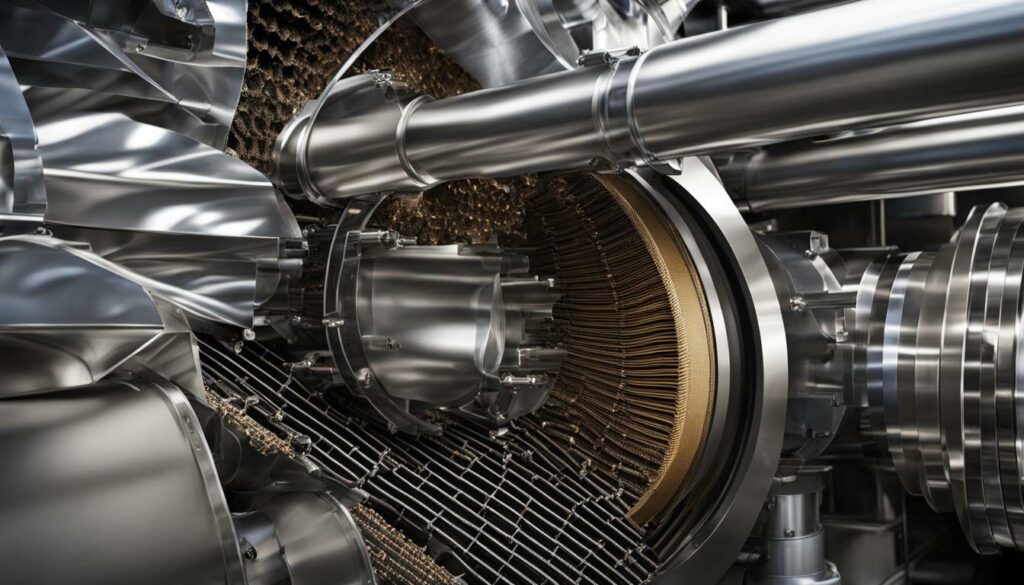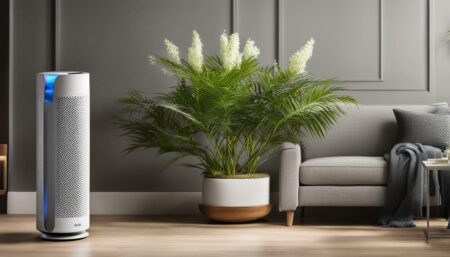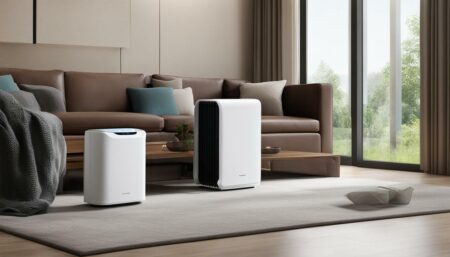Air quality is a crucial component of a healthy living environment, and one of the key elements in ensuring clean air is the use of air purifiers. At the heart of these purifiers are HEPA filters, which are designed to capture and eliminate harmful airborne particles and pollutants, including allergens, dust, and bacteria.
HEPA filters are highly effective in improving indoor air quality, making them a great investment for households and businesses alike. Not only do they reduce the risk of respiratory illnesses, but they also promote overall well-being by ensuring a clean and healthy environment.
Key Takeaways:
- HEPA filters are the foundation of air purifiers and are essential in removing harmful airborne particles and pollutants.
- HEPA filters are highly effective in improving indoor air quality and reducing the risk of respiratory illnesses.
- Investing in air purifiers with HEPA filters promotes overall well-being by ensuring a clean and healthy environment.
Understanding HEPA Filters
HEPA filters are high-efficiency particulate air filters that effectively remove airborne particles from indoor air. They are composed of a filter media made of tiny fibers, which trap contaminants as air passes through. HEPA filters can capture particles as small as 0.3 microns, including common household allergens such as pet dander, pollen, and dust mites.
HEPA filters work by using three mechanisms of capturing particles: interception (where larger particles are trapped by fibers), impaction (where smaller particles collide with fibers and stick to them), and diffusion (where particles are moved by air currents, and stick to fibers as they slow down).
HEPA filters are an essential component of air purifiers and are highly effective in improving indoor air quality. By removing pollutants and allergens from the air, HEPA filters create a healthier living environment for individuals with respiratory concerns.
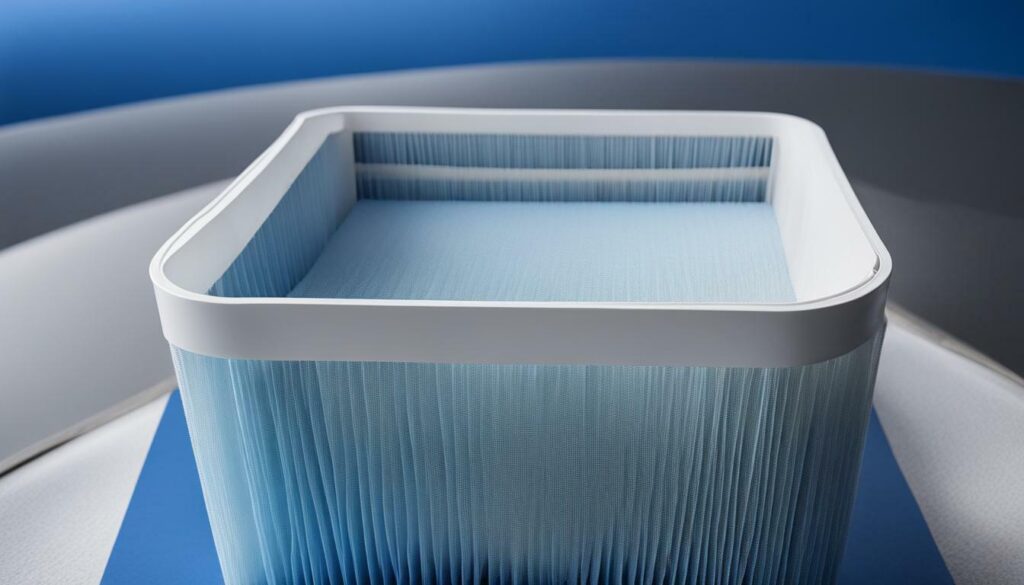
“HEPA filters are an essential component of air purifiers and are highly effective in improving indoor air quality.”
The Benefits of HEPA Filters
HEPA filters are the key component that makes air purifiers effective in air purification. They have the ability to remove up to 99.97% of pollutants, allergens, and particles from the air, down to 0.3 microns in size. This level of filtration ensures that the air in your home or office is consistently clean, fresh, and healthy to breathe.
One of the greatest benefits of HEPA filters is their ability to remove allergens from the air. For individuals with respiratory allergies or asthma, this is especially important. HEPA filters can capture even the smallest particles that may trigger an allergic reaction, such as pollen, dust mites, and pet dander. By removing these allergens from the air, HEPA filters help prevent allergy symptoms and provide a clean air solution for people with allergies.
In addition to allergen removal, HEPA filters also help eliminate common pollutants found indoors, such as smoke, mold, and other airborne toxins. This makes them a valuable asset to any indoor environment where air quality is important.
HEPA filters are also an eco-friendly solution to air purification. They do not require harsh chemicals or produce any harmful by-products, unlike many other air purification technologies. This makes them a safe and sustainable option for indoor air quality management.
Overall, HEPA filters offer a range of benefits that make them an essential part of any air purification system. With their ability to remove allergens, pollutants, and other harmful particles, they provide clean air solutions for people with respiratory concerns. Additionally, they are eco-friendly, making them a safe and sustainable option for improving indoor air quality.
HEPA Filters and HVAC Systems
HEPA filters can be integrated into HVAC filtration systems to enhance their capabilities. By adding advanced air filtration through HEPA filters, HVAC systems can significantly improve indoor air quality throughout a space. HEPA filters effectively capture a wide range of airborne pollutants, including allergens, dust, and bacteria, making them an ideal addition to HVAC systems to provide cleaner and healthier air.
HEPA filters used in HVAC systems are rated with a MERV (minimum efficiency reporting value) rating, which indicates their efficiency in trapping particles. The higher the MERV rating, the more efficient the filter is at capturing smaller particles. This is especially important for individuals with respiratory issues, as smaller particles can be more harmful to their health.
It is important to note that not all HVAC systems are compatible with HEPA filters, as they may require modifications or upgrades to accommodate the filters. It is recommended to consult with a professional HVAC technician to determine the best approach for integrating HEPA filters into a specific HVAC system.
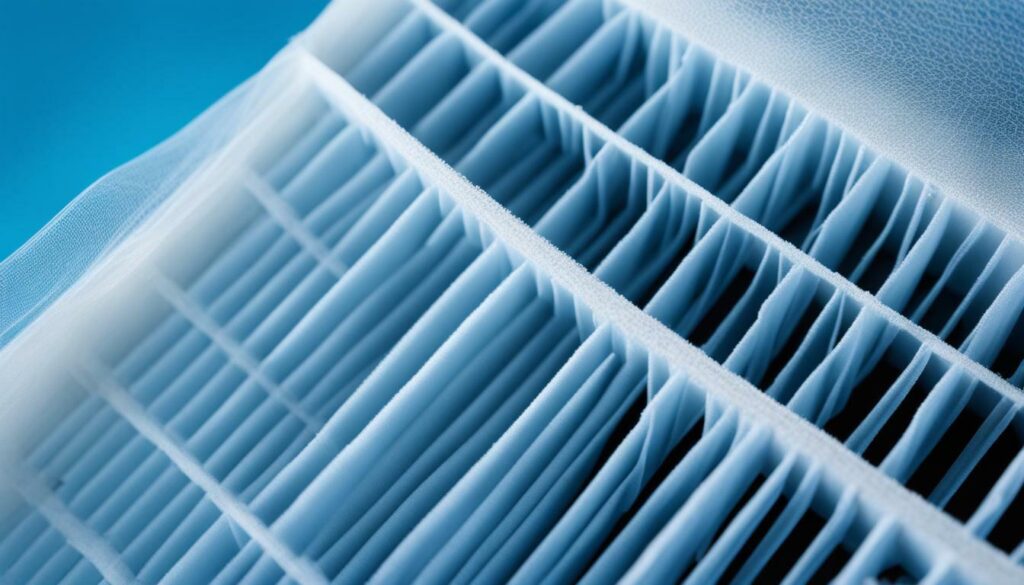
“By adding advanced air filtration through HEPA filters, HVAC systems can significantly improve indoor air quality throughout a space.”
Overall, the integration of HEPA filters into HVAC systems represents a significant step toward improved indoor air quality. As technology continues to advance, we can look forward to more innovative solutions in advanced air filtration that make cleaner and healthier air more accessible to everyone.
Choosing the Right HEPA Filter
When it comes to selecting the right HEPA filter, it’s essential to consider specific factors that cater to individual needs. First, determine the size of the filter required for the air purifier model. Some models may require a larger or smaller filter, so it’s important to check the manufacturer’s recommendations.
Another crucial factor is the efficiency rating. HEPA filters are available in different efficiency ratings, such as H10, H11, H12, H13, and H14, with H14 being the most efficient. Therefore, individuals with severe allergy concerns may require an H14 filter for maximum protection and clean air solutions.
Compatibility with different air purifier models is also crucial. While some filters may be compatible with multiple models, others may only be suitable for specific brands or models. Therefore, it’s important to verify filter compatibility before making a purchase.
Ultimately, the right HEPA filter will make a significant difference in indoor air quality, ensuring effective allergen removal and allergy prevention. Choose the right filter, and breathe easy, knowing clean air solutions are underway.
Maintaining HEPA Filters
Keeping HEPA filters clean is essential for optimum performance and prolonged lifespan. Regular maintenance ensures the elimination of dust and pollutants from the air, providing a clean living environment.
It is recommended to replace HEPA filters every 12 to 18 months, depending on usage. However, it is important to check the manufacturer’s instructions for the recommended replacement schedule, as some filters may need more frequent replacement in high-pollution areas or with heavy usage.
When cleaning HEPA filters, it is important to utilize proper techniques to avoid damaging the filter. HEPA filters should be gently cleaned with a soft-bristled brush or a vacuum cleaner equipped with a soft brush attachment. Avoid using water or cleaning solutions as this can damage the filter and compromise its effectiveness.
Additionally, regularly cleaning the surrounding areas of the filter can prevent the buildup of dust and debris, further promoting effective filtration.
By maintaining HEPA filters, users can ensure they are receiving the optimal benefits of clean air solutions and reduce the risk of indoor air pollution.
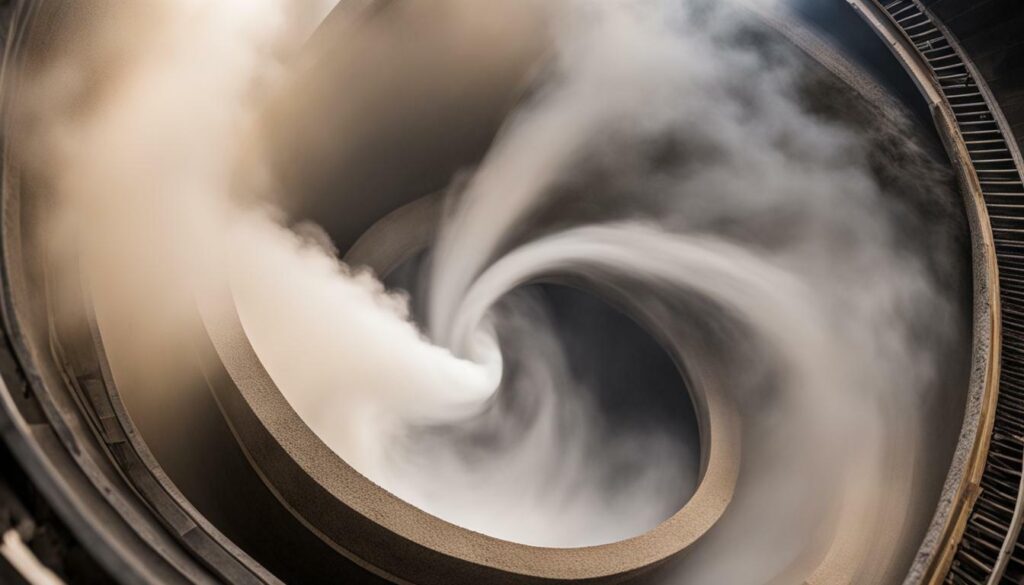
HEPA Filters for Allergy Prevention
If you suffer from allergies or asthma, HEPA filters can be a game-changer for improving your indoor air quality. The high-efficiency particulate air filters in HEPA filters are designed to capture and trap allergens, such as pollen, dust mites, and pet dander, which can trigger allergy symptoms and worsen respiratory issues.
HEPA filters are an important component of air purification systems that contribute to allergy prevention by removing allergens from the air. These filters are up to 99.97% efficient at capturing particles as small as 0.3 microns, making them ideal for allergy sufferers. Additionally, HEPA filters are effective at eliminating unpleasant odors and harmful pollutants, providing a healthier living environment for you and your family.
Using HEPA filters in air purifiers can significantly reduce airborne allergens, leading to fewer allergy symptoms and improved overall respiratory health. Whether you are looking to prevent allergies or just breathe cleaner air, HEPA filters provide a reliable solution for your indoor air quality needs.
The Future of HEPA Filters
The future of HEPA filters looks promising, with advancements in technology driving innovation in air filtration systems.
One area of development is in the use of nanotechnology to create filters that are even more efficient at capturing particles. These filters use tiny fibers, some as small as a few nanometers in diameter, to trap pollutants and allergens.
Another emerging trend is the use of electrostatic filters, which use an electrical charge to trap particles. These filters have been shown to be highly effective at removing pollutants and can be used in conjunction with HEPA filters for even greater air purification.
Additionally, research is being conducted on the use of biotechnology to create filters that mimic the natural air-cleaning abilities of plants. These filters use living organisms to remove pollutants from the air, providing a sustainable and eco-friendly solution to air purification.
As air pollution continues to be a growing concern, the demand for advanced air filtration systems will only increase. HEPA filters, alongside these emerging technologies, will play a crucial role in providing clean air solutions for homes, offices, and other indoor spaces.
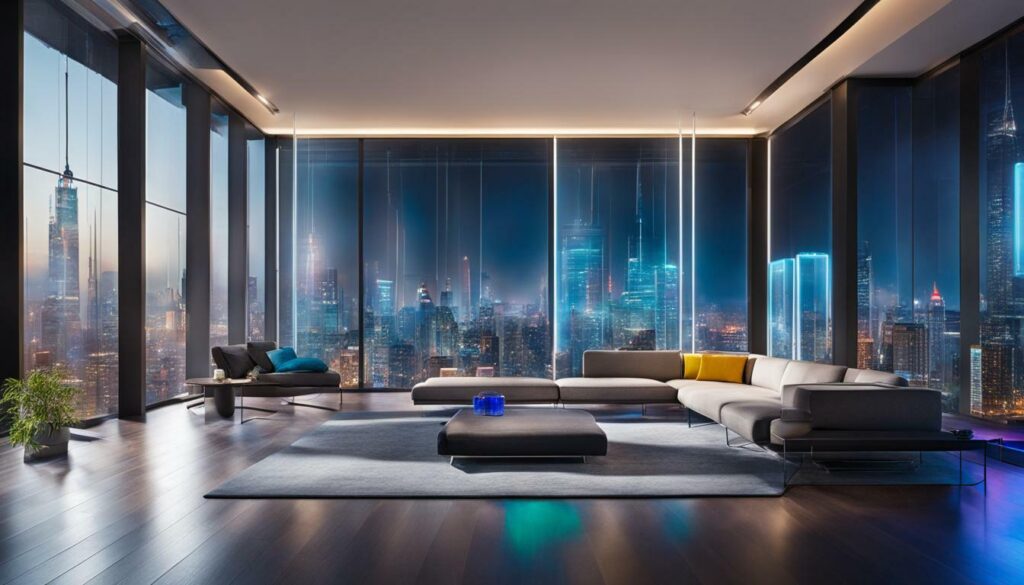
“The development of advanced air filtration technology is essential in combating the negative health effects of air pollution.”
Conclusion
In conclusion, it is evident that HEPA filters play a critical role in enhancing indoor air quality and providing clean air solutions. Their effectiveness in removing allergens, dust, and pollutants from the air ensures a healthier living environment for occupants.
It is essential to choose the appropriate HEPA filter for specific needs, taking into consideration factors such as filter size, efficiency ratings, and compatibility with different air purifier models. Regular maintenance and cleaning of HEPA filters are also crucial in extending their lifespan and ensuring optimal performance in eliminating dust and pollutants.
Furthermore, HEPA filters have proven to be effective in allergy prevention. They capture and trap allergens, providing relief for individuals with allergies or asthma.
As technology continues to advance, HEPA filters are also evolving to improve air filtration capabilities. Emerging trends and innovations in the field of advanced air filtration offer promising solutions for cleaner and healthier air.
Investing in air purifiers equipped with HEPA filters is a practical step towards improving indoor air quality and providing clean air solutions for a healthier living environment.
FAQ
Q: What is the role of HEPA filters in air purifiers?
A: HEPA filters serve as the foundation for cleaner and healthier air by removing allergens, dust, and pollutants from the air.
Q: How do HEPA filters work?
A: HEPA filters use high-efficiency particulate air filtration technology to capture and trap particles as small as 0.3 microns, improving indoor air quality.
Q: What are the benefits of using air purifiers with HEPA filters?
A: Air purifiers equipped with HEPA filters effectively purify the air, remove allergens, and provide clean air solutions for individuals with respiratory concerns.
Q: How do HEPA filters enhance HVAC systems?
A: HEPA filters integrated into HVAC systems enhance the overall air filtration capabilities, improving indoor air quality throughout the space.
Q: How do I choose the right HEPA filter?
A: Consider factors such as filter size, efficiency ratings, and compatibility with different air purifier models when selecting the appropriate HEPA filter for your needs.
Q: How do I maintain HEPA filters?
A: Regular maintenance and cleaning are important for extending the lifespan and ensuring optimal performance of HEPA filters in eliminating dust and pollutants.
Q: Do HEPA filters help prevent allergies?
A: Yes, HEPA filters are effective in capturing and trapping allergens, providing relief for individuals with allergies or asthma.
Q: What advancements can we expect in HEPA filter technology?
A: The future of HEPA filters holds promising advancements in advanced air filtration that can further improve indoor air quality.



